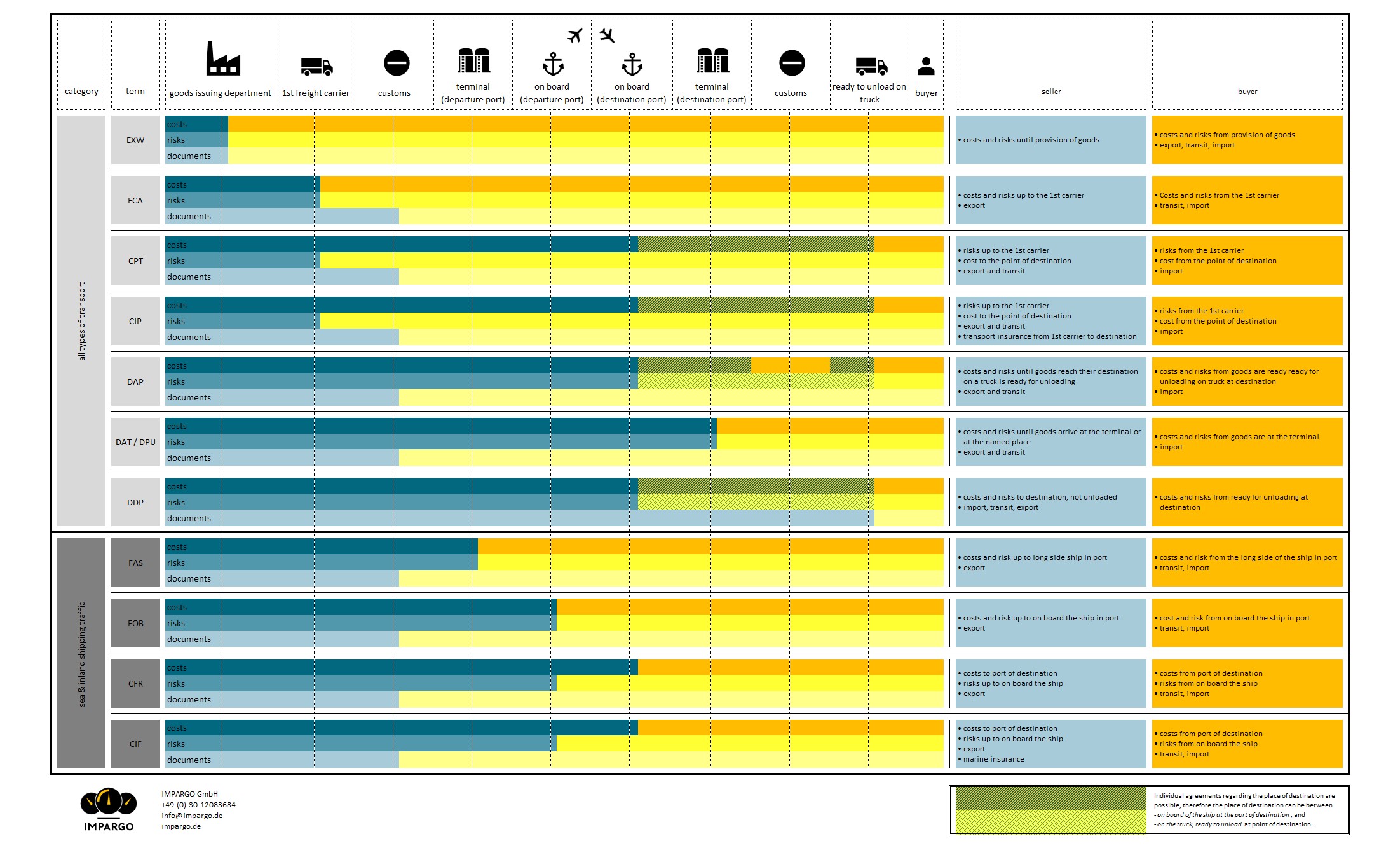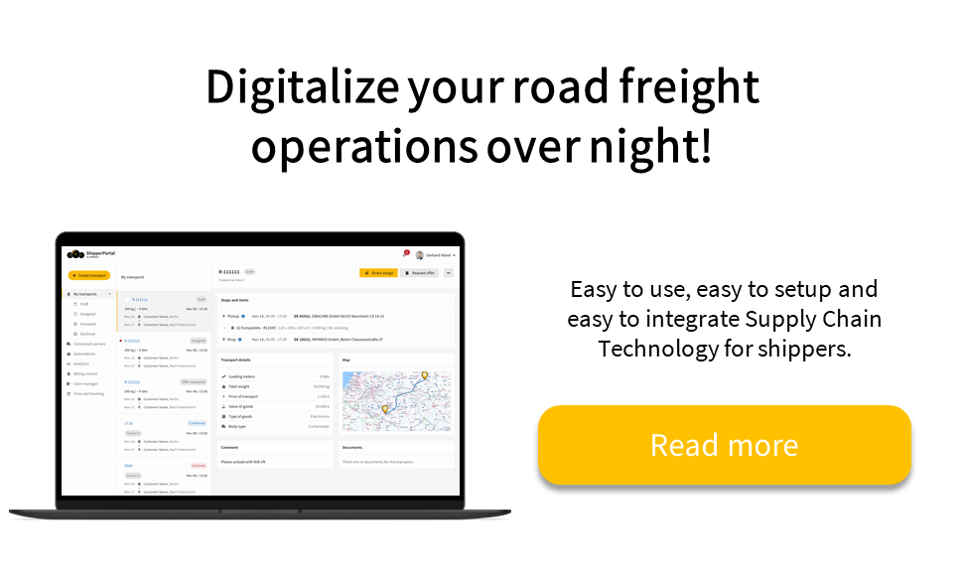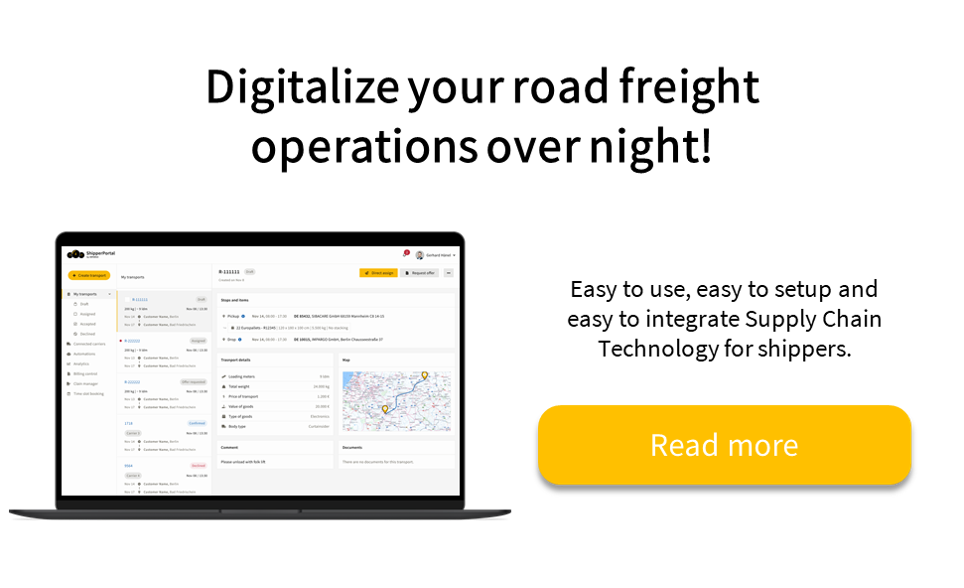Table of contents
- Quick overview
- What does Incoterms 2020 mean?
- What is the function of Incoterms?
- Validity of the Incoterms
- Important changes of Incoterms 2010 to Incoterms 2020
- Important changes of Incoterms 2000 to Incoterms 2010
- List of Incoterms 2020 and Incoterms 2010
7.1 What does incoterm EXW mean? - Ex Works
7.2 What does incoterm FCA mean? - Free Carrier
7.3 What does incoterm CPT mean? - Carriage Paid To
7.4 What does incoterm CIP mean? - Carriage And Insurance Paid To
7.5 What does incoterm DAP mean? - Delivered At Place
7.6 What does incoterm DAT mean? - Delivered At Terminal
7.7 What does incoterm DPU mean? - Delivered Named Place Unloaded
7.8 What does incoterm DDP mean? - Delivered Duty Paid
7.9 What does incoterm FAS mean? - Free Alongside Ship
7.10 What does incoterm FOB mean? - Free On Board
7.11 What does incoterm CFR mean? - Cost And Freight
7.12 What does incoterm CIF mean? - Cost, Insurance And Freight
Quick overview

Incoterms 2020 + Incoterms 2010: Overview
What does Incoterms 2020 mean?
Incoterms are standardized international delivery clauses in shipping. As a contractual agreement between seller and buyer, they encompass all tasks, risks and costs associated with the movement of goods and are considered to be the most important trading conditions worldwide.

What is the function of Incoterms?
In order to avoid misunderstandings between buyer and seller, the contractual rights and obligations of each contracting party should be determined as precisely as possible when concluding a sales contract. Otherwise, misunderstandings, disputes or even judicial conflicts between the parties will occur more frequently, especially when cross-border deliveries of goods are involved.
The International Chamber of Commerce (ICC) dealt with these circumstances back in 1936 and formulated International Commercial Terms (Incoterms). The Incoterms are recognised worldwide and regulate the rights and obligations of buyers and sellers in international trade, thereby standardising global purchase transactions. The Incoterms have been repeatedly revised since they were first published in 1936. In order to avoid any misunderstandings between the contracting parties, it makes sense to specify which version of the Incoterms will be referred to in the sales contract. On 01.01.2011 the seventh revision of the Incoterms was published. The Incoterms 2010 are valid until 31.12.2019 and will be replaced by a newer version. The Incoterms 2020 were published on 10.09.2019 and are valid from 01 January 2020.
If buyer and seller agree on the use of the Incoterms, many important contractual conditions have already been defined. Specifically, aspects such as import, transit and export, the conclusion of insurance and transport contracts, the delivery action and place of delivery, the transfer of risk as well as information obligations are defined.
Validity of Incoterms
The Incoterms are only valid, if they are expressly included in a contract. They are not legal regulations, which is why the contractual partners are free to make individual adjustments to the proposed clauses. At this point it should be added that the Incoterms cannot replace a classic sales contract. They do not contain detailed information on, for example, terms of payment or at time of the transfer of ownership, nor do they take into account product liability, the handling of defects and the legal consequences of breach of contract. The parties must therefore make additional agreements despite the agreement on the Incoterms. By determining, for example, the place of delivery or the place of performance, the Incoterms have influence precisely when agreements are missing in the sales contract.
Important changes from Incoterms 2010 to Incoterms 2020
- The transport of goods can now also be carried out using own vehicles
- DAT was renamed to DPU and can now be unloaded at any agreed location
- Insurance for CIP has been extended to clause ICC A (Institute Cargo Clauses)
- FCA can include the forwarding of bills of lading to the seller by arrangement
- Costs and safety requirements have been specified more precisely for each clause
Important changes from Incoterms 2000 to Incoterms 2010
- DAF, DES, DEQ and DDU were replaced with DAT (Delivered At Terminal) and DAP (Delivered At Place)
- Enhancement of Risk Transfer for FOB, CFR and CIF
- Additional explanations in the form of application notes for the individual clauses
- Communication in electronic form is equivalent to communication in written form
- Also applicable to domestic supplies

List of Incoterms 2020 and Incoterms 2010
Below you can see the official list of the Incoterms 2020 and Incoterms 2010 by the ICC. The first part concerns all modes of transport, while the second part is only relevant for maritime and inland waterway transport. DAT exists only in Incoterms 2010 and will be replaced by DPU in Incoterms 2020.
What does incoterm EXW mean? - Ex Works

Incoterms 2020 + Incoterms 2010: EXW - Ex Works
EXW stipulates that the place of delivery is the seller's. Costs and risks are thus transferred to the buyer as soon as the goods have been made available to the seller at the agreed time or at another agreed place (e.g. factory, warehouse, etc.). The seller has thus fulfilled his contractual obligation as soon as he has packed the goods and marked them accordingly. The transport costs, the procurement of the necessary documents and the associated risks are the sole responsibility of the buyer.
What does incoterm FCA mean? - Free Carrier

Incoterms 2020 + Incoterms 2010: FCA - Free Carrier
FCA's costs and risks are transferred to the buyer when the goods are handed over from the seller to the responsible carrier of the main transport. Depending on the agreement, the seller must also load the goods. The seller has fulfilled his contractual obligation as soon as he has made the goods ready for export and brought them to the agreed carrier or place. The buyer is responsible for the transit and import, the costs of the main transport and the associated risks.
The FCA clause in Incoterms 2020 includes the possibility for the buyer and seller to make an agreement so that the buyer instructs the carrier to send the bill of lading to the seller.
What does incoterm CPT mean? - Carriage Paid To

Incoterms 2020 + Incoterms 2010: CPT - Carriage Paid To
CPT stipulates that the risks of the consignment remain with the seller until he has taken the goods to the carrier designated by him. The costs are not transferred until the goods have arrived at their destination. The seller must therefore have concluded a contract of carriage to the agreed place of destination and bear its costs. In addition, the seller is responsible for export. The buyer is responsible for the transit and import.
What does incoterm CIP mean? - Carriage And Insurance Paid To*

Incoterms 2020 + Incoterms 2010: CIP - Carriage And Insurance Paid To
CIP corresponds to CPT, but the seller must also take over transport insurance for the transport from the time of acceptance by the first carrier to the place of destination and bear its costs.
In the Incoterms 2020 the necessary insurance for deliveries has increased from clause ICC C to ICC A. Further information on the clauses can be found here.
What does incoterm DAP mean? - Delivered At Place

Incoterms 2020 + Incoterms 2010: DAP - Delivered At Place
With DAP, the seller has already fulfilled his obligation to perform, if he has cleared the goods for export and transit and makes them available on the arriving means of transport without having to unload the goods himself. If the goods are available on the means of transport ready for unloading, costs and risks are already with the buyer. The buyer is responsible for the import.
What does incoterm DAT mean? - Delivered At Terminal

Incoterms 2010: DAT - Delivered At Terminal
If the DAT clause is agreed, the seller undertakes to deliver the goods to a specific terminal (including a port quay, warehouse, container depot, etc.). The seller has therefore fulfilled his contractual obligation when he has prepared the goods for export and transit and unloaded them from the arriving means of transport at the agreed destination. As soon as the seller has made the goods available to the buyer for collection, the costs and risks are transferred to the buyer. The buyer is responsible for the import.
This clause is only valid within Incoterms 2010 and will be replaced by the DPU clause in Incoterms 2020.
What does incoterm DPU mean? - Delivered Named Place Unloaded

Incoterms 2020: DPU - Delivered Named Place Unloaded
The DAT clause from Incoterms 2010 will be replaced by the DPU clause within Incoterms 2020. In contrast to the DAT clause, it is possible within the DPU clause to agree on any place and not just a specific terminal. The DAT and DPU clauses are otherwise identical in content.
What does incoterm DDP mean? - Delivered Duty Paid

Incoterms 2020 + Incoterms 2010: DDP - Delivered Duty Paid
According to DDP, the seller clears the goods for export, transit and import and makes them available to the buyer on the arriving means of transport ready for unloading at the place of destination. He bears the costs and risks until the goods are ready for unloading.
What does incoterm FAS mean? - Free Alongside Ship**

Incoterms 2020 + Incoterms 2010: FAS - Free Alongside Ship
With FAS, the seller takes over the export and transport of the goods to the long side of the transport ship at the agreed port of shipment. The main transport costs and the transit and import are the responsibility of the buyer. If the goods are on the long side of the ship, both costs and risks are transferred to the buyer.
What does incoterm FOB mean? - Free On Board**

Incoterms 2020 + Incoterms 2010: FOB - Free On Board
FOB extends FAS by the transport of goods on board the ship.
What does incoterm CFR mean? - Cost And Freight**

Incoterms 2020 + Incoterms 2010: CFR - Cost And Freight
CFR corresponds to FOB, with the difference that with FOB the buyer pays for the ship transport and with CFR the seller. The risks are therefore transferred to the buyer after the goods have been loaded on board the ship, but the costs are not transferred until the seller has had the goods transported to the port of destination.
What does incoterm CIF mean? - Cost, Insurance And Freight*/**

Incoterms 2020 + Incoterms 2010: CIF - Cost, Insurance And Freight
CIF corresponds to CFR, but the seller must also take over sea transport insurance for carriage by sea.
If you would like more detailed information about the Incoterms clauses, you can purchase the Incoterms 2020.
Note: We generally recommend that you determine the location within the agreed place of delivery/destination as precisely as possible, as the risks are transferred to the buyer at this point.
*With CIP and CIF, the seller must take out transport insurance at his own expense. According to the Institute Cargo Clauses, the transport insurance must be concluded with the scope of the minimum coverage. This amounts to 110% of the purchase price (purchase price of the goods + 10% = 110%). In addition the transport insurance must be locked in the currency of the purchase contract.
**Relevant only for sea and inland waterway transport

